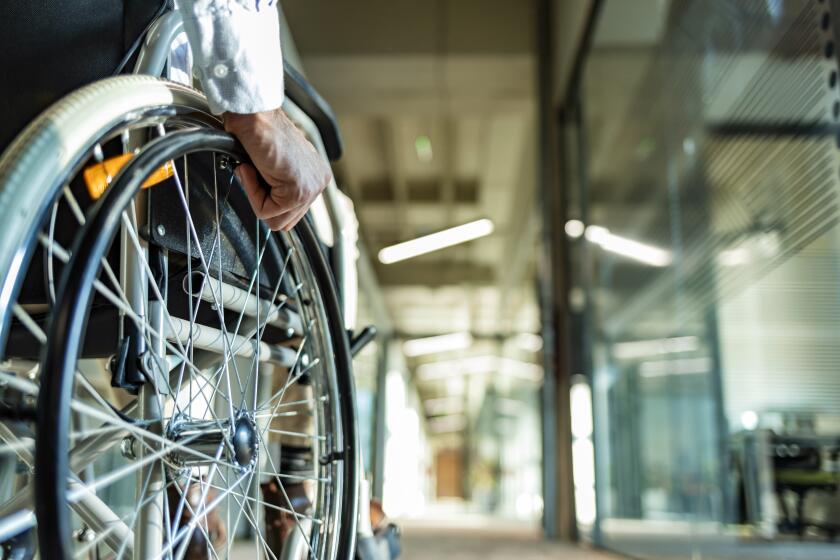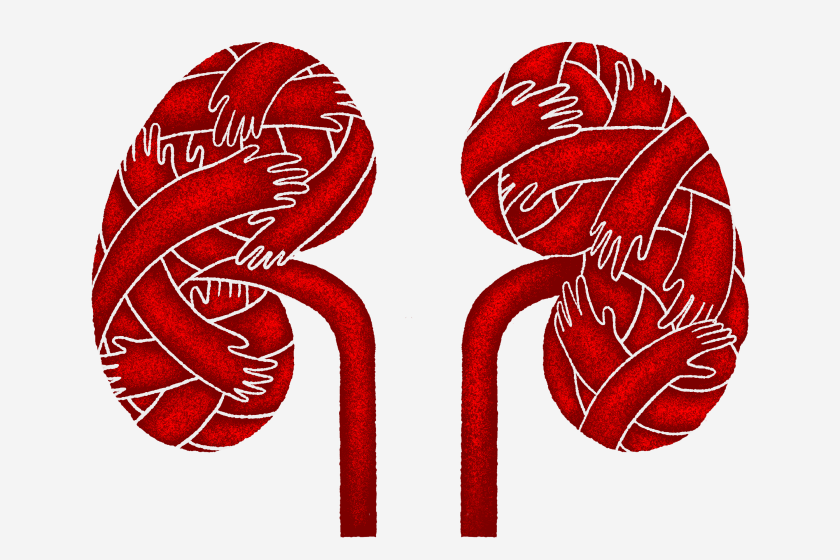My memories of serving in Iraq feel like relics of a life someone else lived. Except for one

- Share via
On Veterans Day, I can’t help but think of my time as a young Marine in Iraq. I could never have imagined then what my life would be like now. The war consumed my whole world back then, and now my memories of it feel like the relics of a life someone else lived.
My life is easy now. I sit in an air-conditioned office, sleep in my own bed every night, and unlike during my time in Iraq, the threat of death and violence are not ever-present — lingering just around a corner.
A few weeks into my deployment in Ramadi we were patrolling with the Iraqi police. My squad was split in two: one half patrolling the city by foot, the other securing the Iraqi police station. I was with the half at the station — waiting.
An IED made me a double amputee, but that didn’t mean I couldn’t continue to serve in the Army
The Army paid me to lead, not to run a marathon. All employers need to recognize that differently abled isn’t unable.
Much of my deployment was spent waiting. Trained to fight, instead I waited for the enemy to find me. Waited for an armor-piercing grenade to be thrown at my vehicle, or for our car to run over the pressure plate of an improvised explosive device, or for a sniper’s bullet to pierce the hot desert air.
At some point, somewhere in the maze of urban warfare, a sniper took position, aiming at my corner. At the same time, two young boys came over to ask me for chocolate, a common occurrence. With the help of our interpreter, I started chatting with them and we were joined by two other Marines, including one I’ll call H, who were roaming between our positions. We joked, took pictures and relished a fleeting moment of normalcy.
Then came a noise I’ve heard in my head every day since. Not the sound of the bullet leaving the rifle — I never heard that — but of it hitting H, who was about an arm’s length to my left and slightly behind me. I looked over and he had disappeared, and when I looked back, the kids, interpreter and other Marines were gone too.
For a moment, I was alone on my corner.
Contributor: The cavalry saved me, and 18 years later, I was the cavalry — with a kidney donation
My ‘non-directed’ donation, to someone I don’t know, saved one life and then some.
I found H taking cover behind an armored vehicle. I began patting him down and then I saw it — a bullet hole torn through the hand guard on his rifle.
It’s an absurd thing to be shot at, and that absurdity hit us both in a way I still have trouble understanding. We laughed. There we were, pinned down by a sniper still concealed in the chaos of an Iraqi city’s architecture, laughing. H had survived by sheer luck — the bullet hit his lower body when the sniper’s target was likely his face. But if you pull the trigger just half a breath too late, you’ll miss.
As time has passed, memories of my deployment, both good and bad, have almost all faded to the recesses of my brain. With one exception: the memories made on that otherwise forgettable corner.
Yes, H survived, but I’ve struggled to leave that corner in the years since. I’ve spent hundreds of hours trying to replay every detail, as if one day I’ll find the clue I once missed. I still wonder: If I hadn’t engaged with those kids, would H have joined me, and if he had not would the sniper have hit me instead? And if so, would I have been as lucky?
I have lived a full life since Iraq — I’ve been immeasurably lucky — but in small ways unnoticed by those around me, I’ve just been standing there alone on my corner. On a night out with friends, on a long walk home, for no reason at all, I will find myself back there under the weight of my gear, the piercing sun beating down on me and H, laughing with the kids.
I’ve lost two friends to an IED blast, but many more Marines I knew have died by suicide. They all had their corners, their moments they just couldn’t leave behind. Days they replayed in their minds but never spoke about out loud.
Suicide prevention and crisis counseling resources
If you or someone you know is struggling with suicidal thoughts, seek help from a professional and call 9-8-8. The United States’ first nationwide three-digit mental health crisis hotline 988 will connect callers with trained mental health counselors. Text “HOME” to 741741 in the U.S. and Canada to reach the Crisis Text Line.
Nearly a decade after that day in Ramadi, I did something I wish so many more could — I asked for help from a therapist. We talked a lot about forgiveness and about peace. Not the kind of peace that comes from no longer hearing the sounds of war, but the kind that comes with acceptance.
I served in the Marines during a time of protracted combat operations, and I did so in the shadow of giants. For too long I felt that I hadn’t sacrificed enough to warrant getting help — not nearly as much as those giants. But I was wrong.
No veteran is solely a sum of their combat experience, least not myself. We don’t have to justify needing help. We simply have to give ourselves permission to take the first step.
Evan Cohen lives in Los Angeles, working in venture capital. He served six years as an infantryman in the United States Marine Corps Reserve, deploying once to Ramadi, Iraq.
More to Read
A cure for the common opinion
Get thought-provoking perspectives with our weekly newsletter.
You may occasionally receive promotional content from the Los Angeles Times.











